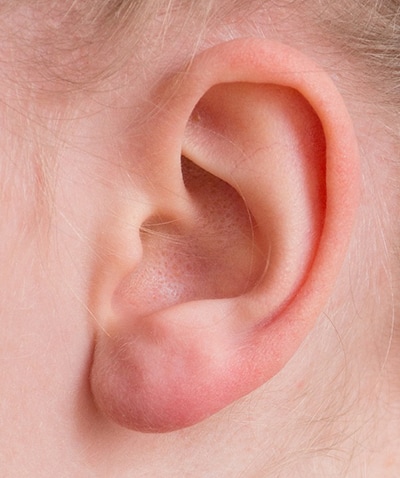Ears
Responsible for hearing and balance
| Download this episode | Your ears do a lot more than just hold up your sunglasses. They are responsible for your ability to hear as well as your balance. The outer ear, the part you can see, collects sound waves. When we hear a sound, it travels along the ear canal and causes the eardrum to vibrate. The vibration of the eardrum causes movement of the three bones located in the middle ear. These three bones move against the cochlea, located in the inner ear, which transforms sound into nerve impulses that travel to the brain, where they are translated as sound. Loop-shaped canals in your inner ear contain fluid and fine, hairlike sensors that help you keep your balance. At the base of the canals are the utricle and saccule, each containing a patch of sensory hair cells. Within these cells are tiny particles that help monitor the position of your head in relation to gravity and linear motion, such as going up and down in an elevator or moving forward and backward in a car. | Almost half the people in the U.S. over 65 have some degree of hearing loss. If you have difficulty hearing conversations, especially in the presence of background noise, or if you are constantly asking others to repeat what they said, you may have a problem. If you feel that people are mumbling when they talk, if you have difficulty hearing someone on the phone or you avoid social settings that involve conversation, you should talk to a specialist about your hearing. And if you had to turn up the volume on your radio louder than others in the room prefer to hear me, you most likely have a hearing problem. Hearing loss can have a significant effect on your quality of life. Older adults with hearing loss may report feelings of depression. Because hearing loss can make conversation difficult, some people withdraw from activities and experience feelings of isolation. Hearing loss is also associated with cognitive impairment and decline. | You might want to think twice the next time you pick up a cotton swab to clean out your ears. The ear canal has glands that produce a waxy oil called cerumen. The wax will most often make its way to the outer opening of the ear. There it will fall out or be removed by washing. Ear wax protects the ear by trapping and preventing dust, bacteria, and other germs and small objects from entering and damaging the ear. It also protects the delicate skin of the ear canal from getting irritated when water is in the canal. In some people, the glands produce more wax than can be easily removed from the ear. This extra wax may harden in the ear canal and block the ear, causing an impaction. Wax blockage is one of the most common causes of hearing loss. When you try to clean the ear with a cotton swab, you may instead push wax deeper and block the ear canal. For this reason, health care providers recommend against trying to reach into your ear to clean it. | Wearing a helmet protects your head when you ride a motorcycle, but what can you do to protect your ears? Whether you are at home or at work, you should wear hearing protection when you are exposed to loud levels of noise. This includes when you’re mowing the lawn, using a leaf blower or even a hair dryer. When using stereos or home theater systems, avoid high volume levels. If you think it’s too loud, it probably is. When using personal sound systems, the volume should be at a comfortable level. If someone else can hear what you’re listening to with ear buds, the volume is too high. It’s a good idea to remove the headphones from time to time to give your ears a rest. Be sure to wear earplugs at rock concerts, nightclubs and loud motor sporting events. And keep your car’s sound system set at a sensible volume. Doing this can help you avoid hearing damage and allow you to hear and yield to any police or emergency vehicles. | Degeneration of the inner ear’s structures occurs over time, which will affect your ability to hear. However, there are a number of pre-emptive steps you can take to prevent noise-induced hearing loss and avoid the worsening of age-related hearing loss. Dr. Allison Gill, an audiologist in UAMS’ Ear, Nose and Throat Clinic, says limiting the duration and intensity of your exposure to noise is the best protection. In the workplace, plastic or foam earplugs or glycerin-filled earmuffs can help protect your ears from damaging noise. Dr. Gill says it’s a good idea to consider getting regular hearing tests if you work in a noisy environment. And avoid recreational risks to your hearing. Activities such as riding a motorcycle, hunting, using power tools or listening to rock concerts can damage your hearing over time. Wearing hearing protectors or taking breaks from the noise can protect your ears. Turning down the music volume is helpful, too.
Transcript
You may have a hearing loss
Transcript
Put down the cotton swab
Transcript
How to protect your ears
Transcript
Limit your exposure to noise
Transcript
